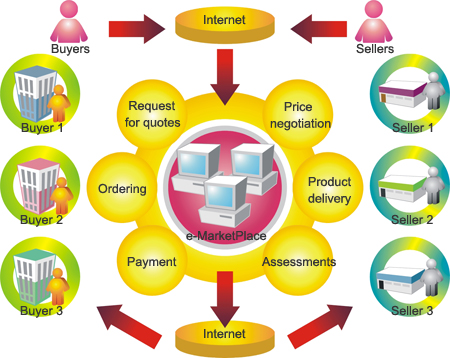
As is common in the world of e-commerce, there were predictions of what was going to be in the future of business on the Web. One of these prediction was that there would be a location in which businesses could access information about their particular industry as well as other functions. These would have been known as vertical portals, or vortals, since they would offer a "doorway" to the Internet and offer services to just one industry. However, this is not how things happened, but some of the same ideas are still integrated into business processes today.

Independent Industry Marketplaces
Although things did not go as predicted, they are still being integrated today. The vertical portals that were supposed to form are known by different names, based on their specific functions. They include:
- Industry marketplaces - focused on a single industry.
- Independent exchanges - not controlled by a company that is an established party in the industry.
- Public marketplaces - open to new buyers and sellers just entering the industry.
Collectively, the term independent industry marketplaces has been used to label these portals. However, these marketplaces have only had a short time of success, and have gone from more than 2200 in mid-2000 to less than 80 in 2008, and have now been labeled as one of four B2B makretplace models: private stores, customer portals, private company marketplace, and industry consortia-sponsored maketplaces.
Private Stores, Customer Portals & Private Company Marketplaces
Some companies offer their regular customers an option to shop on their Web site through the use of private stores, which are protected by a password and offer the consumer discounts on items that the consumer has agreed to purchase a minimum amount of.
Other companies take this one step further by offering services such as part number cross-referencing, product manuals, safety information, and other services that would be unprouctive if the company was to participate in an industry marketplace.
A private company marketplace is one that provides services to companies that are wanting to create their own marketplaces. Some of these services include auctions, request for quote postings, and others similar to those offered by e-procurement software.

Industry Consortia-Sponsored Marketplaces
An indusry consortia-sponsored marketplace is one formed by many large buyers in an industry that often times did not have the power to force suppliers to deal with them through other marketplaces. Along with the other marketplace models, a large portion of business has been taken away from the orignal industry marketplaces, even though some companies still include participants of the industry in their ownership.
Below is a summary of the marketplace categories in place today, but by no means do all businesses have to or even do conform to just one of these five; most have aspects of some or all of the five.
- Private stores on sellers' sites
- One seller, many buyers
- Examples are Cisco and Dell
- Few products, fixed pricing
- Customer portals
- Few sellers, many buyers
- Example is Grainger
- Catalog-based, fixed pricing
- Independent industry marketplaces
- Many sellers and buyers
- Example is ChemConnect
- Offer auctions, dynamic pricing
- Consortia-supported marketplaces
- Few buyers, many sellers
- Examples are Covisint and Exostart
- Buyer control, fixed pricing
- Private company marketplaces
- One buyer, many sellers
- Example is Harley-Davidson's Supply Net
- Seller bids on major buyers' business